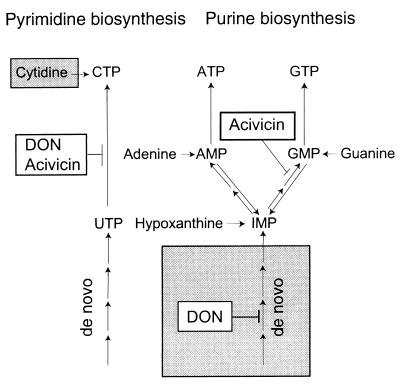Figure 6.
The targets of DON and acivicin in T. brucei and mammalian cells. All pathways shown for the synthesis of UTP, CTP, ATP, and GTP exist in mammalian cells, whereas the trypanosomes lack salvage pathways for CTP synthesis (left shaded box) and de novo purine biosynthesis (right shaded box). DON targets the CTP synthetase in the trypanosomes, whereas it mainly targets de novo purine biosynthesis in mammalian cells. A combination therapy of DON and any of the purine bases (adenine, guanine, or hypoxanthine) would bypass the block on de novo purine biosynthesis, and it therefore would spare the human cells, whereas the trypanosomes would still be targeted. Acivicin is targets the CTP synthetase and GMP synthase in trypanosomes as well as in mammalian cells. However, the trypanosomes cannot compensate for the block on CTP synthetase by salvaging cytidine. Therefore, a combination therapy of acivicin with cytidine and guanine should spare the mammalian cells and kill the trypanosomes. For simplicity, we have not included purine nucleosides in the scheme; in principle, adenosine, guanosine, and inosine can replace adenine, guanine, and hypoxanthine. The salvage pathways for UTP synthesis are also omitted, because they are not relevant to our work.

